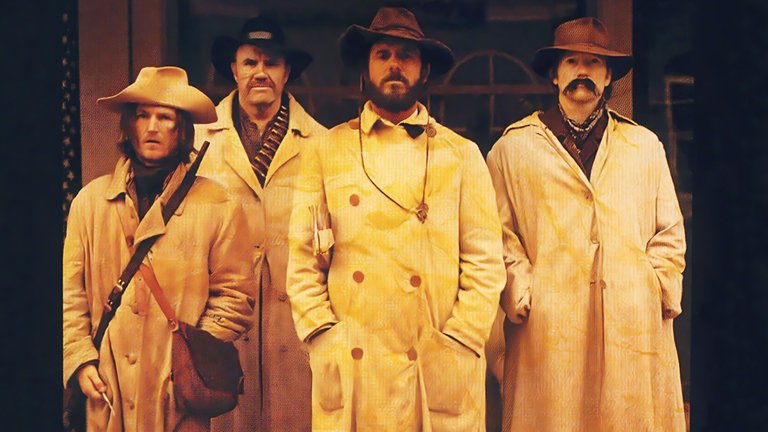Film Review: The Great Northfield, Minnesota Raid (1972)

The New Hollywood era of the 1970s was defined by its relentless deconstruction of Old West myths, as filmmakers sought to dismantle the romanticised tropes of traditional Westerns. Iconic outlaws like Jesse James, previously portrayed as Robin Hood-esque heroes or tragic rebels, were subjected to revisionist scrutiny. The James-Younger Gang, in particular, had been mythologised in countless films as symbols of Southern defiance against Northern industrial capitalism. It was thus inevitable that their most infamous act—the disastrous 1876 robbery of Northfield, Minnesota—would receive a gritty, unvarnished treatment. Phillip Kaufman’s The Great Northfield, Minnesota Raid, released in 1972, answered this call, though its semi-comical irreverence and uneven execution left audiences and critics divided. The film’s attempt to strip away the gang’s legendary aura was ambitious, yet its execution often felt disjointed, caught between satire and solemnity.
The plot unfolds in Missouri in 1876, a decade after the Civil War, where the James-Younger Gang—led by Cole Younger (Cliff Robertson) and Jesse James (Robert Duvall)—has become notorious for robbing banks and trains. Once seen as folk heroes by sympathetic Southerners resentful of Northern economic dominance, the gang now faces relentless pursuit by Pinkerton detectives hired by railroad and banking magnates. Cole, weary of the outlaw life and desperate for stability, clings to hope that a pending Missouri amnesty bill will grant him and his men a reprieve. However, a botched ambush by Pinkerton agents in a brothel leaves Cole injured and his faith in the bill’s passage shattered. Determined to secure the funds needed to counter potential bribes against the legislation, Cole devises a daring plan: rob a bank in Northfield, Minnesota, a town far from their usual territory and populated by Union veterans hostile to Southern causes. Despite the risks, Cole manipulates locals into depositing gold in the bank, swelling the potential loot. The heist, however, unravels catastrophically. The townspeople, quick to arm themselves, surround the gang, resulting in a violent shootout. Most of the gang, including Cole and his brothers, are killed or captured, though Jesse James escapes—unaware that his life, too, would end violently years later in a betrayal.
Kaufman’s film systematically dismantles the myths that had long clung to the James-Younger Gang. Perhaps its most radical move is its unflinching rejection of Jesse James as a romanticised figure. Earlier films had framed him as a noble, if misguided, champion of the Confederacy or a Robin Hood-like thief who redistributed wealth to the downtrodden. Here, Robert Duvall’s portrayal subverts this entirely: James is no visionary, but a volatile, dim-witted psychopath prone to fits of rage and delusional messianic fantasies. His actions are driven not by ideology, but by a compulsive need for violence and infamy. This portrayal strips away the myth of his nobility, reducing him to a chaotic force whose legacy is built on fear rather than reverence.
Even more iconoclastic is Kaufman’s decision to centre the narrative on Cole Younger rather than Jesse James. Cliff Robertson’s performance as Cole—a charismatic, calculating leader—anchors the film. Unlike Jesse, Cole is introspective, weary of the gang’s lawless existence, and acutely aware that the “Wild West” is fading into history. His motivations are pragmatic: he seeks not infamy, but a secure future for himself and his family. This shift in focus humanises Cole, presenting him as the gang’s true intellectual and moral core. Kaufman underscores this through subtle details: Cole’s fascination with emerging technologies and baseball reflects his longing to adapt to a changing world, adding a poignant undercurrent of nostalgia and inevitability.
The film’s irreverent tone, however, is its most contentious aspect. Kaufman borrows from the naturalistic, sardonic spirit of Robert Altman’s McCabe and Mrs. Miller (1971), portraying the Old West as a grimy, morally ambiguous space. Scenes of violence are interspersed with darkly comic moments, such as Cole’s baseball game with townsfolk or the gang’s absurdly inept planning of the heist. Yet this approach is uneven: the levity occasionally undermines the film’s darker themes, creating tonal whiplash. While the humor occasionally lands—particularly in Cole’s charm as he manipulates Minnesota locals—the relentless bleakness of the gang’s downfall demands a more consistent tone.
Kaufman’s direction is serviceable but unremarkable. The film’s pacing is brisk, and the final robbery sequence is tense and well-staged, though it pales beside Walter Hill’s masterful retelling of the same event in The Long Riders (1980). Hill’s version, while less comedic, offers tighter focus on the gang’s dynamics and a haunting score by Ry Cooder that elevates its emotional weight. In contrast, The Great Northfield, Minnesota Raid suffers from a forgettable score by Dave Grusin, which lacks the thematic depth needed to sustain the narrative.
Ultimately, The Great Northfield, Minnesota Raid fails to fully capitalise on its premise. Its deconstruction of Western myths is bold but uneven, hampered by tonal inconsistencies and a script that struggles to balance satire with gravitas. The film’s strengths—Robertson’s nuanced performance, the sharp critique of Jesse James’ mythos, and Cole’s complex humanity—are overshadowed by pacing issues and a finale that, while dramatic, lacks the visceral impact of Hill’s later interpretation. Despite these flaws, it remains a fascinating artifact of New Hollywood revisionism, a flawed yet occasionally incisive meditation on myth, legacy, and the end of an era.
RATING: 6/10 (++)
Blog in Croatian https://draxblog.com
Blog in English https://draxreview.wordpress.com/
InLeo blog https://inleo.io/@drax.leo
Hiveonboard: https://hiveonboard.com?ref=drax
InLeo: https://inleo.io/signup?referral=drax.leo
Rising Star game: https://www.risingstargame.com?referrer=drax
1Inch: https://1inch.exchange/#/r/0x83823d8CCB74F828148258BB4457642124b1328e
BTC donations: 1EWxiMiP6iiG9rger3NuUSd6HByaxQWafG
ETH donations: 0xB305F144323b99e6f8b1d66f5D7DE78B498C32A7
BCH donations: qpvxw0jax79lhmvlgcldkzpqanf03r9cjv8y6gtmk9